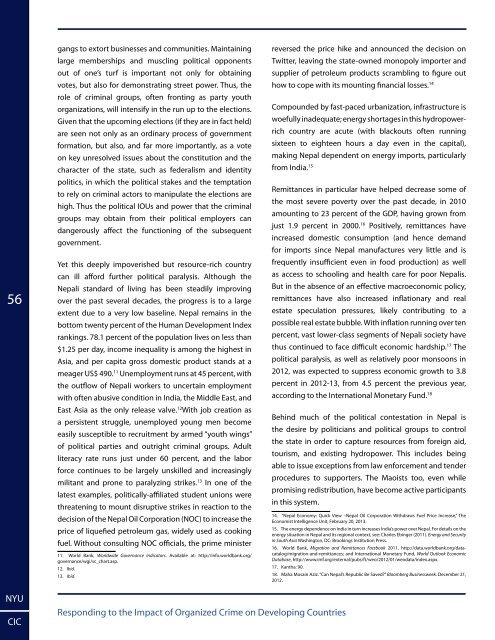here - Center on International Cooperation - New York University
here - Center on International Cooperation - New York University
here - Center on International Cooperation - New York University
Create successful ePaper yourself
Turn your PDF publications into a flip-book with our unique Google optimized e-Paper software.
56<br />
gangs to extort businesses and communities. Maintaining<br />
large memberships and muscling political opp<strong>on</strong>ents<br />
out of <strong>on</strong>e’s turf is important not <strong>on</strong>ly for obtaining<br />
votes, but also for dem<strong>on</strong>strating street power. Thus, the<br />
role of criminal groups, often fr<strong>on</strong>ting as party youth<br />
organizati<strong>on</strong>s, will intensify in the run up to the electi<strong>on</strong>s.<br />
Given that the upcoming electi<strong>on</strong>s (if they are in fact held)<br />
are seen not <strong>on</strong>ly as an ordinary process of government<br />
formati<strong>on</strong>, but also, and far more importantly, as a vote<br />
<strong>on</strong> key unresolved issues about the c<strong>on</strong>stituti<strong>on</strong> and the<br />
character of the state, such as federalism and identity<br />
politics, in which the political stakes and the temptati<strong>on</strong><br />
to rely <strong>on</strong> criminal actors to manipulate the electi<strong>on</strong>s are<br />
high. Thus the political IOUs and power that the criminal<br />
groups may obtain from their political employers can<br />
dangerously affect the functi<strong>on</strong>ing of the subsequent<br />
government.<br />
Yet this deeply impoverished but resource-rich country<br />
can ill afford further political paralysis. Although the<br />
Nepali standard of living has been steadily improving<br />
over the past several decades, the progress is to a large<br />
extent due to a very low baseline. Nepal remains in the<br />
bottom twenty percent of the Human Development Index<br />
rankings. 78.1 percent of the populati<strong>on</strong> lives <strong>on</strong> less than<br />
$1.25 per day, income inequality is am<strong>on</strong>g the highest in<br />
Asia, and per capita gross domestic product stands at a<br />
meager US$ 490. 11 Unemployment runs at 45 percent, with<br />
the outflow of Nepali workers to uncertain employment<br />
with often abusive c<strong>on</strong>diti<strong>on</strong> in India, the Middle East, and<br />
East Asia as the <strong>on</strong>ly release valve. 12 With job creati<strong>on</strong> as<br />
a persistent struggle, unemployed young men become<br />
easily susceptible to recruitment by armed “youth wings”<br />
of political parties and outright criminal groups. Adult<br />
literacy rate runs just under 60 percent, and the labor<br />
force c<strong>on</strong>tinues to be largely unskilled and increasingly<br />
militant and pr<strong>on</strong>e to paralyzing strikes. 13 In <strong>on</strong>e of the<br />
latest examples, politically-affiliated student uni<strong>on</strong>s were<br />
threatening to mount disruptive strikes in reacti<strong>on</strong> to the<br />
decisi<strong>on</strong> of the Nepal Oil Corporati<strong>on</strong> (NOC) to increase the<br />
price of liquefied petroleum gas, widely used as cooking<br />
fuel. Without c<strong>on</strong>sulting NOC officials, the prime minister<br />
11. World Bank, Worldwide Governance Indicators. Available at: http://info.worldbank.org/<br />
governance/wgi/sc_chart.asp.<br />
12. Ibid.<br />
13. Ibid.<br />
reversed the price hike and announced the decisi<strong>on</strong> <strong>on</strong><br />
Twitter, leaving the state-owned m<strong>on</strong>opoly importer and<br />
supplier of petroleum products scrambling to figure out<br />
how to cope with its mounting financial losses. 14<br />
Compounded by fast-paced urbanizati<strong>on</strong>, infrastructure is<br />
woefully inadequate; energy shortages in this hydropowerrich<br />
country are acute (with blackouts often running<br />
sixteen to eighteen hours a day even in the capital),<br />
making Nepal dependent <strong>on</strong> energy imports, particularly<br />
from India. 15<br />
Remittances in particular have helped decrease some of<br />
the most severe poverty over the past decade, in 2010<br />
amounting to 23 percent of the GDP, having grown from<br />
just 1.9 percent in 2000. 16 Positively, remittances have<br />
increased domestic c<strong>on</strong>sumpti<strong>on</strong> (and hence demand<br />
for imports since Nepal manufactures very little and is<br />
frequently insufficient even in food producti<strong>on</strong>) as well<br />
as access to schooling and health care for poor Nepalis.<br />
But in the absence of an effective macroec<strong>on</strong>omic policy,<br />
remittances have also increased inflati<strong>on</strong>ary and real<br />
estate speculati<strong>on</strong> pressures, likely c<strong>on</strong>tributing to a<br />
possible real estate bubble. With inflati<strong>on</strong> running over ten<br />
percent, vast lower-class segments of Nepali society have<br />
thus c<strong>on</strong>tinued to face difficult ec<strong>on</strong>omic hardship. 17 The<br />
political paralysis, as well as relatively poor m<strong>on</strong>so<strong>on</strong>s in<br />
2012, was expected to suppress ec<strong>on</strong>omic growth to 3.8<br />
percent in 2012-13, from 4.5 percent the previous year,<br />
according to the Internati<strong>on</strong>al M<strong>on</strong>etary Fund. 18<br />
Behind much of the political c<strong>on</strong>testati<strong>on</strong> in Nepal is<br />
the desire by politicians and political groups to c<strong>on</strong>trol<br />
the state in order to capture resources from foreign aid,<br />
tourism, and existing hydropower. This includes being<br />
able to issue excepti<strong>on</strong>s from law enforcement and tender<br />
procedures to supporters. The Maoists too, even while<br />
promising redistributi<strong>on</strong>, have become active participants<br />
in this system.<br />
14. “Nepal Ec<strong>on</strong>omy: Quick View –Nepal Oil Corporati<strong>on</strong> Withdraws Fuel Price Increase,” The<br />
Ec<strong>on</strong>omist Intelligence Unit, February 20, 2013.<br />
15. The energy dependence <strong>on</strong> India in turn increases India’s power over Nepal. For details <strong>on</strong> the<br />
energy situati<strong>on</strong> in Nepal and its regi<strong>on</strong>al c<strong>on</strong>text, see: Charles Ebinger (2011). Energy and Security<br />
in South Asia Washingt<strong>on</strong>, DC: Brookings Instituti<strong>on</strong> Press.<br />
16. World Bank, Migrati<strong>on</strong> and Remittances Factbook 2011, http://data.worldbank.org/datacatalog/migrati<strong>on</strong>-and-remittances;<br />
and Internati<strong>on</strong>al M<strong>on</strong>etary Fund, World Outlook Ec<strong>on</strong>omic<br />
Database, http://www.imf.org/external/pubs/ft/weo/2012/01/weodata/index.aspx.<br />
17. Kantha: 90.<br />
18. Maha Mosain Aziz. “Can Nepal’s Republic Be Saved?” Bloomberg Businessweek. December 21,<br />
2012.<br />
NYU<br />
CIC<br />
Resp<strong>on</strong>ding to the Impact of Organized Crime <strong>on</strong> Developing Countries
















